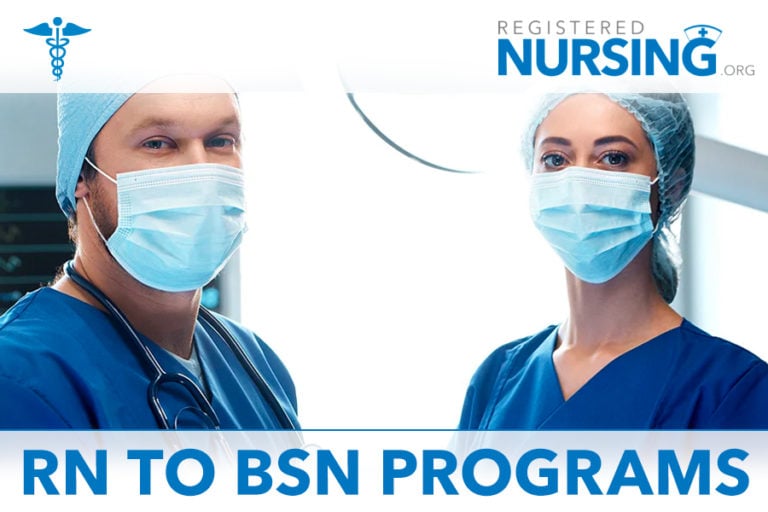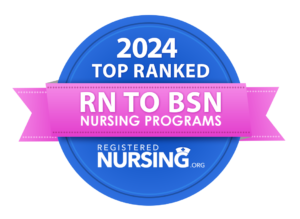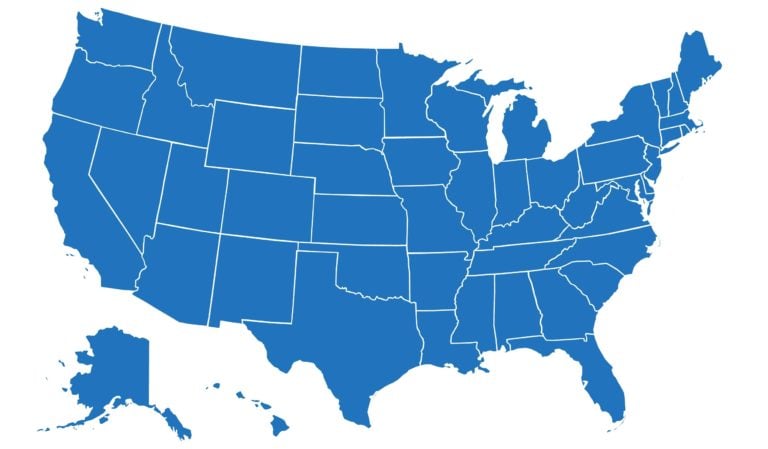RN to BSN Programs: What School is Right for You?
- 2024 - Best Online RN to BSN Programs
- Find RN to BSN Degree Programs Near You
- Is an RN to BSN Degree Program Right for Me?
- RN to BSN Degree Program Requirements, Affordability, and Curriculum
- Pros vs. Cons of Online RN to BSN Degree Programs
- RN to BSN FAQs
- Traditional BSN vs. RN to BSN vs. RN to MSN
- Other Popular RN Bridge Programs

Within the last few years, the push to hire bachelor’s educated registered nurses has gained momentum. It seems likely that in the future, a bachelor’s degree will be the minimum education requirement for registered nurses.
For decades, leaders in the field of nursing have encouraged associate’s and diploma-level nurses to pursue a Bachelor of Science in Nursing (BSN) degree. Research has proven that nurses with this degree experience improved job satisfaction, improved patient outcomes, and fewer clinical errors. RN to BSN bridge programs help nurses advance their education in a cost-effective and timely manner.
Interested in an online RN to BSN program?
2024 - Best Online RN to BSN Programs

Many RNs are considering a return to school to advance their education with an online RN to BSN degree program. Finding the right online program can be tricky, which is why we have ranked the top online RN to BSN programs across the nation. Why trust our rankings? We source objective data from trusted organizations such as The Integrated Postsecondary Education Data System (IPEDS) and the U.S. Department of Education’s Office of Postsecondary Education (OPE), among others. We also use a detailed points system to rank our schools, incorporating factors such as:
- If the school is accredited
- If the program offers online options
- Acceptance and graduation rates
- Tuition and fees (adjusted for cost of living)
For more information on our top nursing school rankings, visit our Methodology Page (https://www.registerednursing.org/rankings-methodology/).
University of North Carolina-Wilmington
University of North Carolina-Wilmington offers a rigorous, online RN to BSN program designed for nurses seeking to practice family-centered nursing in a range of settings. The community-focused program covers providing healthcare to an aging population as well as research, clinicals and leadership.
- RN to BSN Online/Hybrid

- Continuous admission with six start dates.
- Affordable in-state tuition rates.
- Practical experiences must be completed in health care settings.
Cabarrus College of Health Sciences
Nurses who want to stay current with industry trends can do so with the online RN-BSN program at Cabarrus College of Health Sciences. Alumni and graduates of partner institutions can enroll in the RN-BSN program at greatly reduced tuition rates. This affordable, top-notch degree can be completed in 18 months.
- RN to BSN Online/Hybrid

- The flexible program is created for working RNs.
- School graduates can take advantage of reduced pricing.
- Streamlined application process.
Mount Carmel College of Nursing
The recognized online RN to BSN program at Mount Carmel College of Nursing enables students to finish their degree in two to three semesters. The student-focused program includes nursing informatics, caring practices for leadership and the community, and foundational coursework.
- RN to BSN Online/Hybrid

- Online program meets Quality Matters Certification.
- Clinical or practice experiences are required.
- All-inclusive tuition pricing with no surprises.
University of Central Florida
The University of Central Florida (UCF), a public institution in Orlando, embraces accessibility in healthcare education. UCF offers an online RN-to-BSN program, reflecting its commitment to accommodating working nurses. With a focus on flexibility, UCF's program facilitates academic advancement for registered nurses, fostering a culture of lifelong learning.
- RN to BSN Online/Hybrid

- Emphasizes the development of leadership.
- Multiple start dates.
- Clinical requirements.
Stony Brook University
Stony Brook University, a distinguished public institution in Long Island, champions accessibility in nursing education. Offering an online RN-to-BSN program, Stony Brook combines academic rigor with flexibility, empowering working nurses to advance their careers. The program reflects the university's commitment to fostering excellence in nursing through accessible and innovative education.
- RN to BSN Online/Hybrid

- Boasts multiple start dates.
- The program integrates clinical requirements.
- Competitive tuition structure.
Baptist Health Sciences University
Baptist Health Sciences University in Memphis, TN offers a top-ranked RN to BSN degree program that can be completed in a year by dedicated students. In completing the program, nurses increase their competencies in clinical reasoning as well as providing holistic care for diverse populations.
- RN to BSN Online/Hybrid

- Online and in-person course delivery options.
- Up to three start dates per year.
- Faith-based education curriculum.
Union University
Union University, a private Christian institution of higher learning, offers a fast-moving, top-ranked online RN to BSN program. Technology in Nursing and Population-Focused Health (Community and World) are just a few courses. The holistic program includes professional – as well as spiritual, psychological and sociocultural components.
- RN to BSN Online/Hybrid

- The RN to BSN is available across the U.S. via E-Campus online.
- Earn your degree in 18 months (not including gen ed courses).
- Apply for fall or spring semester.
California State University - Fullerton
California State University, Fullerton (CSUF), a public university in Southern California, prioritizes accessible nursing education. CSUF offers a dynamic online RN-to-BSN program, combining academic excellence with flexibility for working nurses. The program aligns with CSUF's commitment to advancing healthcare through innovative and inclusive education.
- RN to BSN Online Campus

- Incorporates an interdisciplinary approach.
- Provides flexibility for working nurses.
- Affordable tuition structure.
Louisiana State University
Louisiana State University (LSU), a public institution known for academic excellence, offers an online RN-to-BSN program. This convenient and flexible program reflects LSU's commitment to accessible education and aligns with its philosophy of preparing nurses for leadership roles in a dynamic healthcare landscape.
- RN to BSN Online/Hybrid

- Fosters a collaborative learning environment.
- Program incorporates clinical components.
- Program providse flexibility and accessibility.
Maryville University
Maryville University, a private institution committed to innovation, offers an online RN-to-BSN program. This dynamic program aligns with Maryville's philosophy of forward-thinking education, providing flexibility and accessibility for working nurses while preparing them for leadership roles in an evolving healthcare landscape.
- RN to BSN Online/Hybrid

- Combines academic rigor with personalized support for nurses.
- The program encompasses an interdisciplinary approach.
- Places a strong emphasis on clinical application.
We have curated 300+ RN to BSN program listings across the country. See options near you by selecting your state below.

- AL Alabama
- AK Alaska
- AZ Arizona
- AR Arkansas
- CA California
- CO Colorado
- CT Connecticut
- DE Delaware
- DC Washington, DC
- FL Florida
- GA Georgia
- HI Hawaii
- ID Idaho
- IL Illinois
- IN Indiana
- IA Iowa
- KS Kansas
- KY Kentucky
- LA Louisiana
- ME Maine
- MD Maryland
- MA Massachusetts
- MI Michigan
- MN Minnesota
- MS Mississippi
- MO Missouri
- MT Montana
- NE Nebraska
- NV Nevada
- NH New Hampshire
- NJ New Jersey
- NM New Mexico
- NY New York
- NC North Carolina
- ND North Dakota
- OH Ohio
- OK Oklahoma
- OR Oregon
- PA Pennsylvania
- RI Rhode Island
- SC South Carolina
- SD South Dakota
- TN Tennessee
- TX Texas
- UT Utah
- VT Vermont
- VA Virginia
- WA Washington
- WV West Virginia
- WI Wisconsin
- WY Wyoming
Is an RN to BSN Degree Program Right for Me?
For the registered nurse who enjoys the field of nursing and wishes to either:
- Stay competitive in the field
- Learn even more about how to be a great nurse and help people, or
- Wishes to shift gears to a non-clinical position
The answer is "absolutely!"
How Fast Can I Complete an RN to BSN Degree?
The general requirement for an RN to BSN program is 120 total credit hours – this includes undergraduate hours already completed during the student’s prior associate's degree program.
For most students, an RN to BSN program consists of around 30 credits of upper-level courses. Depending on your attendance schedule and how many transferrable credits you bring to the table, this can take anywhere from two to four consecutive semesters (or 8 to 24 months on average) to complete.
The breakdown is generally:
- 60 undergraduate credit hours (which is the associate's degree you already have)
- 30 upper-level BSN courses
- Most schools will require employment as an RN while enrolled in the program.
Check out some of the fastest RN to BSN program options.
RN to BSN Degree Program Requirements, Affordability, and Curriculum
While specific RN to BSN program requirements will vary by school, some basics most schools will share are:
- Graduate of an accredited ADN or nursing diploma program
- Active, unencumbered RN Licensure
- Criminal background check and/or drug test
- Completion of general admission criteria, including minimum GPA (usually 2.0 or above) and prerequisite courses
- Full-time RN employment or equivalency exams – about 30 hours of clinical hours or equivalency exams are required; full-time working RNs will often have this satisfied already but exams can also be utilized; check with your school’s advisor for clarification.
How Affordable are RN to BSN Programs?
RN to BSN program tuition and costs will depend on the city/state and school type and are always subject to change. It’s a good idea to check with each school regarding current tuition rates before enrolling to get a fuller picture of what you can expect. The good news is that RN to BSN programs are usually much more affordable than traditional 4-year BSN programs. On average, RN to BSN costs typically range from $8,000 to $30,000 depending on various factors, including:
- The type of institution (public vs. private)
- The program’s delivery format (online vs. in-person)
- Residency status (in-state vs. out-of-state tuition)
- Additional mandatory fees such as technology, lab, and textbook costs
What Classes Are Required for an RN to BSN Program?
RN to BSN programs build on knowledge and experience nurses need to help grow in critical thinking, leadership, and clinical skills.
Whether nurses are seeking to advance in their current role or explore other areas, nursing programs are designed to equip nurses with the knowledge and training they need to excel.
RN to BSN program curriculum varies by school, but generally includes courses such as:
- Community Health Nursing
- Evidence-Based Practice
- Statistics for Nurses
- RN Collaborative Healthcare
- Nursing Management
- Healthcare Informatics
- Nursing Ethics
- Nursing Leadership
- Nutrition
Pros vs. Cons of Online RN to BSN Degree Programs
There are many online RN to BSN degree programs available for nurses who want to take the next step in their careers. Online programs have grown in popularity in recent years due to their flexibility and convenience, particularly for working nurses and those with familial obligations.
Not sure if you want to enroll in an online or campus-based degree program? Consider some of the pros and cons of online RN to BSN programs below.
Advantages of Online RN to BSN Programs
- Flexibility - Online RN to BSN programs often allow students to complete coursework anytime and from any location.
- Cost-Effectiveness - Online programs often have lower tuition rates and eliminate commuting, parking, and campus housing costs. They are often designed for working RNs so they can continue earning an income while enrolled.
- Technological Proficiency - Online learning helps you become more proficient with digital tools and technology, which are increasingly important in healthcare settings.
- Diverse Learning Resources - Online programs provide access to many digital resources, including recorded lectures and interactive forums. They also allow students to network and collaborate with peers from any geographic location.
- Self-Paced Learning - Many online programs allow you to progress through the material at a pace that suits your learning style and schedule.
Disadvantages of Online RN to BSN Programs
- Limited Hands-On Experience - While not always required, online programs may offer fewer opportunities for in-person clinical practice. While virtual simulations may be available, they are often not as robust as on-campus simulation labs.
- Self-Discipline Required - Successful completion of an online program requires strong self-discipline and time management skills to keep up with coursework and deadlines. Those who struggle with procrastination may find it difficult to stay motivated.
- Technology Dependence - Reliable internet access and up-to-date technology are essential, and technical difficulties can disrupt your studies. If you struggle with navigating technology, there may be a steep learning curve in utilizing digital tools.
- Limited Peer Interaction - Limited face-to-face interactions with fellow classmates and instructors can impact learning and networking opportunities. Some students may feel isolated without the social interaction of a campus-based program.
- Accreditation and Reputation - Not all online RN to BSN programs are created equal. It’s important to ensure that the program is accredited and has a good reputation to ensure that future employers respect the degree. Learn more about nursing school accreditation.
RN to BSN FAQs
Some great organizations offering nursing scholarships and/or grants include:
- National Institutes of Health (NIH) Undergraduate Scholarship Program (UGSP)
- Nurse Corps Scholarship Program
- Gates Millennium Scholars Program
- Minority Nurse Scholarship List
- HRSA Health Workforce
- NLN Nursing Education Scholarships
- The Foundation of the National Student Nurses' Association Scholarships
- Barbara Rhomberg Excellence in Nursing Scholarship
- Meland Foundation Nursing Scholarship
Students have many options when it comes to paying for an RN to BSN program, all with their own advantages and drawbacks. Be sure you fully understand your options, and don't be afraid to contact your school's financial aid office for additional information. Common payment methods include:
- Scholarships and grants - often merit-based and don't need to be paid back, but students must maintain a minimum academic GPA.
- Loans - Federal or private loans are available, but students must be prepared to pay them back with interest.
- Cash - If you have the funds upfront or are utilizing help from family or friends.
- Payment plans - Ask your school for more information on payment plan options.
- Tuition reimbursement - Ask your current employer if they offer a tuition reimbursement plan, but be mindful of any stipulations (i.e. having to commit to working for them for a certain amount of time after graduating).
Clinical hours are not typically required for the RN to BSN degree program due to the fact that the student would have already completed the required clinical hours in order to become licensed. However, there are RN to BSN programs that do include clinical learning modules to enhance nursing skills. It's always a good idea to check the specific requirements of any RN to BSN program you may be considering to see exactly what the curriculum entails.
Yes! And not only can you work, but most schools require it!
Maintaining full-time employment as a registered nurse during the RN to BSN program is encouraged by most schools. Not only does this satisfy the 30 “clinical hours” requirement of many RN to BSN programs, but it allows for the nurse to take advantage of the employer's tuition reimbursement programs and qualify for certain nursing scholarships and grants.
Many registered nursing positions are waiting to be filled throughout the country’s healthcare facilities. For many years, the nursing community has been pushing to eliminate the Associate’s Degree in Nursing (ADN) in favor of the Bachelor's of Science in Nursing (BSN).
Major reasons for this shift to higher education include:
- Research to support better patient outcomes by RNs with a BSN
- Increasing availability of BSN programs and RN to BSN bridge programs
- Europe, New Zealand, and Australia already require a BSN for entry-level RN jobs
- Highly complex healthcare environment requires higher education
- More opportunities for nurses to advance, hold leadership roles, and specialize with a BSN-level degree
Traditional BSN vs. RN to BSN vs. RN to MSN
Find out how an RN to BSN program compares to two other popular nursing degree pathways: the traditional BSN and the RN to MSN.
| Traditional BSN | RN to BSN | RN to MSN | |
|---|---|---|---|
| Target Audience | High school graduates or transfer students | Registered Nurses (RNs) with an Associate’s Degree or Diploma | RNs with an Associate’s Degree or Diploma |
| Duration | 4 years (full-time) | 1-2 years (full-time or part-time) | 2-3 years (full-time or part-time) |
| Entry Requirements | High school diploma, prerequisites, entrance exams | Current RN license, Associate’s Degree or Diploma in Nursing | Current RN license, Associate’s Degree or Diploma in Nursing |
| Curriculum Focus | Comprehensive nursing education, general education courses | Advanced nursing courses, leadership, and management, community health | Advanced nursing courses, leadership, management, specialized tracks (e.g., Nurse Practitioner, Nurse Educator) |
| Clinical Practice | Extensive clinical rotations throughout the program | Limited clinical practice, often based on current RN work | Intensive clinical practice, often includes advanced practice experiences |
| Mode of Delivery | Popular on-campus but online/hybrid options available | Online, hybrid, or in-person | Online, hybrid, or in-person |
| How Affordable? | Higher overall cost due to longer duration | Lower cost due to shorter duration and online options | Higher cost, but varies with online or hybrid options and specialization |
| Outcome Degree | Bachelor of Science in Nursing (BSN) | Bachelor of Science in Nursing (BSN) | Master of Science in Nursing (MSN) |
| Career Opportunities | Entry-level nursing positions, eligibility for RN licensure | Advanced nursing roles, leadership positions, higher salary potential | Advanced practice roles (e.g., Nurse Practitioner, Clinical Nurse Specialist), leadership positions, higher salary potential |
| Licensure Preparation | Prepares for NCLEX-RN | Already licensed as an RN, no additional licensure required | Prepares for advanced practice certification exams depending on specialization |
| Flexibility | Less flexible, fixed schedule and location | Highly flexible, accommodates working RNs | Flexible, accommodates working RNs, but more demanding than RN to BSN |
| Advancement Potential | Foundation for advanced nursing education (e.g., MSN, DNP) | Pathway to MSN or other advanced degrees | Direct entry into advanced nursing roles and higher education (e.g., DNP, PhD) |
Other Popular RN Bridge Programs
Nursing bridge programs exist at many different levels. Learn more about some of the other RN bridge programs students are enrolling in.

LPN to RN
If you're a current Licensed Practical/Vocational Nurse (LPN/LVN), there's a specific pathway to help you reach your RN goals. Consider the LPN to RN or the LPN to BSN.
RN to MSN
Are you an ADN or diploma-educated RN and know you want to earn your Master's of Science in Nursing (MSN) degree? Skip the BSN and go right into an RN to MSN program.
RN to NP
Dreaming of becoming a Nurse Practitioner (NP)? If you are already an RN, consider the convenient RN to NP bridge program pathway.
BSN to DNP
If you have a BSN in hand and wish to pursue a doctoral nursing degree, the BSN to DNP pathway may be right for you.
